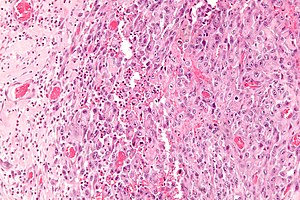Difference between revisions of "Epithelioid sarcoma"
Jump to navigation
Jump to search
(→Images: more images) |
m |
||
| Line 30: | Line 30: | ||
'''Epithelioid sarcoma''' is a rare malignant [[soft tissue lesions|soft tissue lesion]]. | '''Epithelioid sarcoma''' is a rare malignant [[soft tissue lesions|soft tissue lesion]]. | ||
[[Sarcomas]] with an epithelioid morphology are covered in ''[[epithelioid sarcomas]]''. | |||
==General== | ==General== | ||
*Rare. | *Rare. | ||
Revision as of 15:58, 28 September 2013
| Epithelioid sarcoma | |
|---|---|
| Diagnosis in short | |
 Epithelioid sarcoma. H&E stain. | |
|
| |
| LM | epithelioid morphology and spindle morphology (predominant pattern dependent on location), +/-prominent nucleolus, zonal necrosis with an irregular border |
| Subtypes | proximal type, distal type |
| LM DDx | carcinoma, rheumatoid nodule, granuloma annulare, malignant rhabdoid tumour |
| IHC | INI1 -ve, CK7 +ve, vimentin +ve, S-100 -ve, CD34 +ve |
| Site | soft tissue - usu. extremities |
|
| |
| Clinical history | usu. young adults |
| Symptoms | mass lesion |
| Prevalence | rare |
| Blood work | CA-125 elevated |
Epithelioid sarcoma is a rare malignant soft tissue lesion.
Sarcomas with an epithelioid morphology are covered in epithelioid sarcomas.
General
- Rare.
- Adolescents, young adults.
- Serum CA-125 may be useful for following clinically.[1]
Subclassification:[2]
- Proximal type:
- More aggressive.
- Distal type:
Microscopic
Features:[3]
- Epithelioid morphology and spindle morphology - which predominates is dependent on location (see subclassification).
- +/-Prominent nucleolus - distinctive feature.
- Zonal necrosis with irregular border.
- Descriptors: "Garland necrosis", necrosis with "scalloped border" = necrotic regions with irregular border.
Subclassification:[2]
- Proximal-type (proximal location):
- More epithelioid.
- Distal-type (distal location):
- More spindled.
- Granuloma-like pattern.
DDx:
- Carcinoma.
- Rheumatoid nodule.
- Granuloma annulare.
- Malignant rhabdoid tumour.
Images
www:
IHC
Features:[4]
- INI1 (SMARCB1[5]) -ve.[6]
- Vimentin +ve.
- Various keratins +ve.
- Keratin 8, Keratin 19 +ve.
- 34betaE12 +ve/-ve.
- CD34 +ve.
- Malignant rhabdoid tumour -ve.
Others:
See also
References
- ↑ 1.0 1.1 Hoshino, M.; Kawashima, H.; Ogose, A.; Kudo, N.; Ariizumi, T.; Hotta, T.; Umezu, H.; Hatano, H. et al. (Mar 2010). "Serum CA 125 expression as a tumor marker for diagnosis and monitoring the clinical course of epithelioid sarcoma.". J Cancer Res Clin Oncol 136 (3): 457-64. doi:10.1007/s00432-009-0678-1. PMID 19756736.
- ↑ 2.0 2.1 Guillou L, Wadden C, Coindre JM, Krausz T, Fletcher CD (February 1997). ""Proximal-type" epithelioid sarcoma, a distinctive aggressive neoplasm showing rhabdoid features. Clinicopathologic, immunohistochemical, and ultrastructural study of a series". Am. J. Surg. Pathol. 21 (2): 130–46. PMID 9042279.
- ↑ The International Agency for Research on Cancer (Editors: Fletcher, C.D.M.; Unni, K. Krishnan; Mertens, F.) (2006). Pathology and Genetics of Tumours of Soft Tissue and Bone (IARC WHO Classification of Tumours) (3rd ed.). World Health Organization. pp. 205. ISBN 978-9283224136.
- ↑ Miettinen M, Fanburg-Smith JC, Virolainen M, Shmookler BM, Fetsch JF (August 1999). "Epithelioid sarcoma: an immunohistochemical analysis of 112 classical and variant cases and a discussion of the differential diagnosis". Hum. Pathol. 30 (8): 934–42. PMID 10452506.
- ↑ Online 'Mendelian Inheritance in Man' (OMIM) 601607
- ↑ Mentzel T (March 2010). "[Epithelioid sarcoma: morphologic variants and differential diagnosis]" (in German). Pathologe 31 (2): 135–41. doi:10.1007/s00292-009-1250-0. PMID 19997734.
- ↑ Humble, SD.; Prieto, VG.; Horenstein, MG. (Apr 2003). "Cytokeratin 7 and 20 expression in epithelioid sarcoma.". J Cutan Pathol 30 (4): 242-6. PMID 12680954.
- ↑ Lee, HI.; Kang, KH.; Cho, YM.; Lee, OJ.; Ro, JY. (Jun 2006). "Proximal-type epithelioid sarcoma with elevated serum CA 125: report of a case with CA 125 immunoreactivity.". Arch Pathol Lab Med 130 (6): 871-4. doi:10.1043/1543-2165(2006)130[871:PESWES]2.0.CO;2. PMID 16740043.







